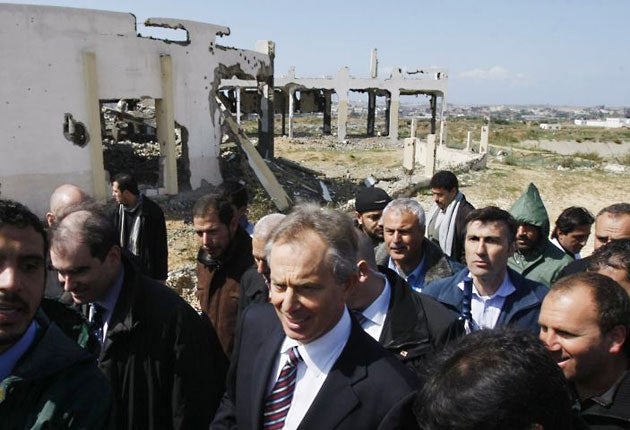Blair says Gaza crossings must be opened to assist rebuilding
Former Prime Minister makes first visit to territory since becoming envoy

Tony Blair has called for Gaza's crossings to be opened for basic building and other commercial goods, adding to international pressure on Israel likely to be exerted at today's Egypt-hosted post-war reconstruction summit.
On his long-awaited first visit to the Palestinian territory as Middle East envoy from the international quartet – the UN, US, EU and Russia – Mr Blair said that the 20-month blockade inflicted on the territory's 1.5 million inhabitants "does not work".
He made the comments while calling for an end to violence, including rockets fired by Gazan militants into Israel.
Mr Blair was speaking after meeting senior UN officials, prominent Gazan businessmen and civil society leaders who pressed for an early opening of the crossings to help the reconstruction of some 15,000 homes damaged or destroyed in Israel's 22-day offensive, and start reviving the territory's collapsed economy.
The envoy – whose visit to a UN school in this northern Gaza town was the first since he came here as prime minister in November 2001 – acknowledged before flying to Sharm el Sheikh for the reconstruction conference that the "devastation is enormous" and said it was necessary to "find a different and better way of dealing with this situation".
He said that unless there is material for rebuilding Gazan homes, and some hope of economic improvement, it will "undermine the prospect of peace". He added: "A blockade of all the Gazan people does not work."
His remarks reinforce indications that Hillary Clinton, the US Secretary of State – who brings a pledge of up to $900m to today's conference before visiting Israel and the West Bank this week – is also pressing Israel to open the crossings to more than basic humanitarian goods, at least to hasten the process of reconstruction.
The moderate Palestinian leadership based in the West Bank – which is seeking to take both the responsibility and the political credit for post-war reconstruction in Gaza – has submitted a $2.8bn plan to donors at today's conference.
Salam Fayad, the West Bank authority's Prime Minister, said he would today urge an immediate lifting of the blockade which Israel imposed after Hamas's martial seizure of control in the Strip in June 2007.
The World Bank, whose managing director, Juan Jose Daboub, also joined a stream of high profile diplomatic visitors to Gaza in recent days, warned in a pre-conference report that carrying out the plan would only be possible if restrictions blocking "the predictable entry of basic materials into Gaza – including cement, steel, glass, equipment, and spare parts – are lifted".
The British Secretary of State for International Development, Douglas Alexander, who pledged £30m for emergency rebuilding on the first visit to Gaza by a British minister since Hamas's takeover, also called for "improved access" and urged Israel to relax its stringent restrictions on the categories of goods allowed across the border.
Mr Alexander said he had been "horrified by the scale of human suffering that I have witnessed".
He added: "I come with a very clear message that as the British Government we want to see full and unfettered access both for aid and for aid workers here in Gaza."
Nevertheless, prospects for implementation also face the daunting obstacle of the control exerted in Gaza by Hamas, which has not been invited to today's conference.
Israel, and most of the international community, has made it clear it wants a return to the 2005 agreement brokered by Mrs Clinton's predecessor, Condoleezza Rice, which put control of the Palestinian side of the crossings under the authority of President Mahmoud Abbas.
Join our commenting forum
Join thought-provoking conversations, follow other Independent readers and see their replies
0Comments